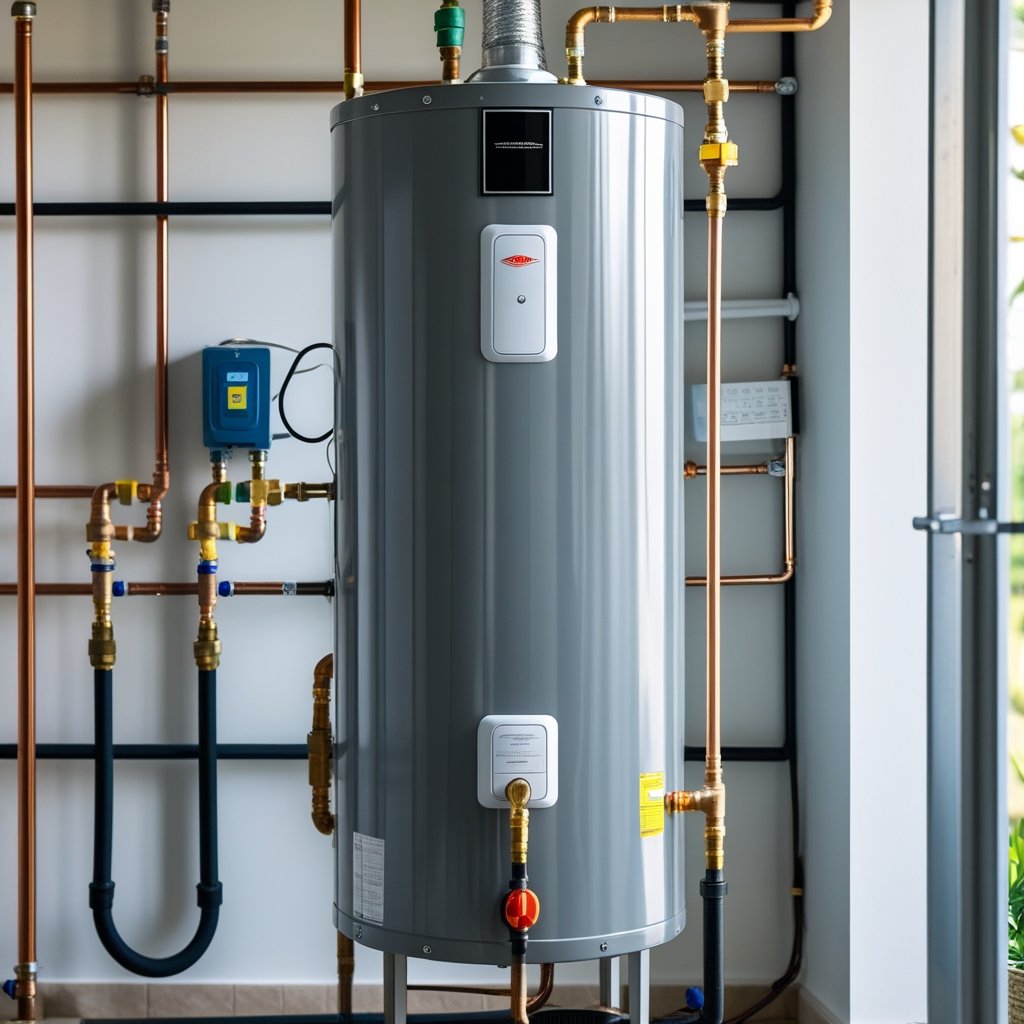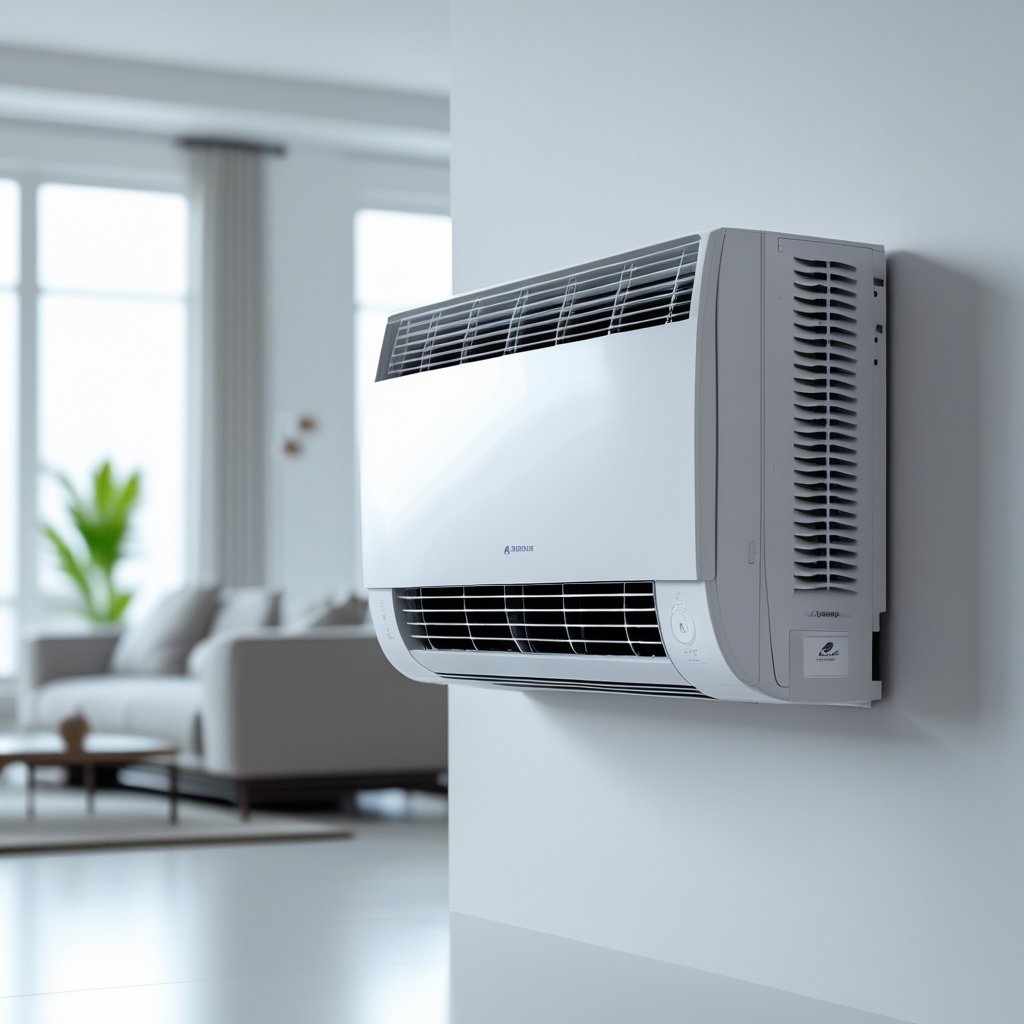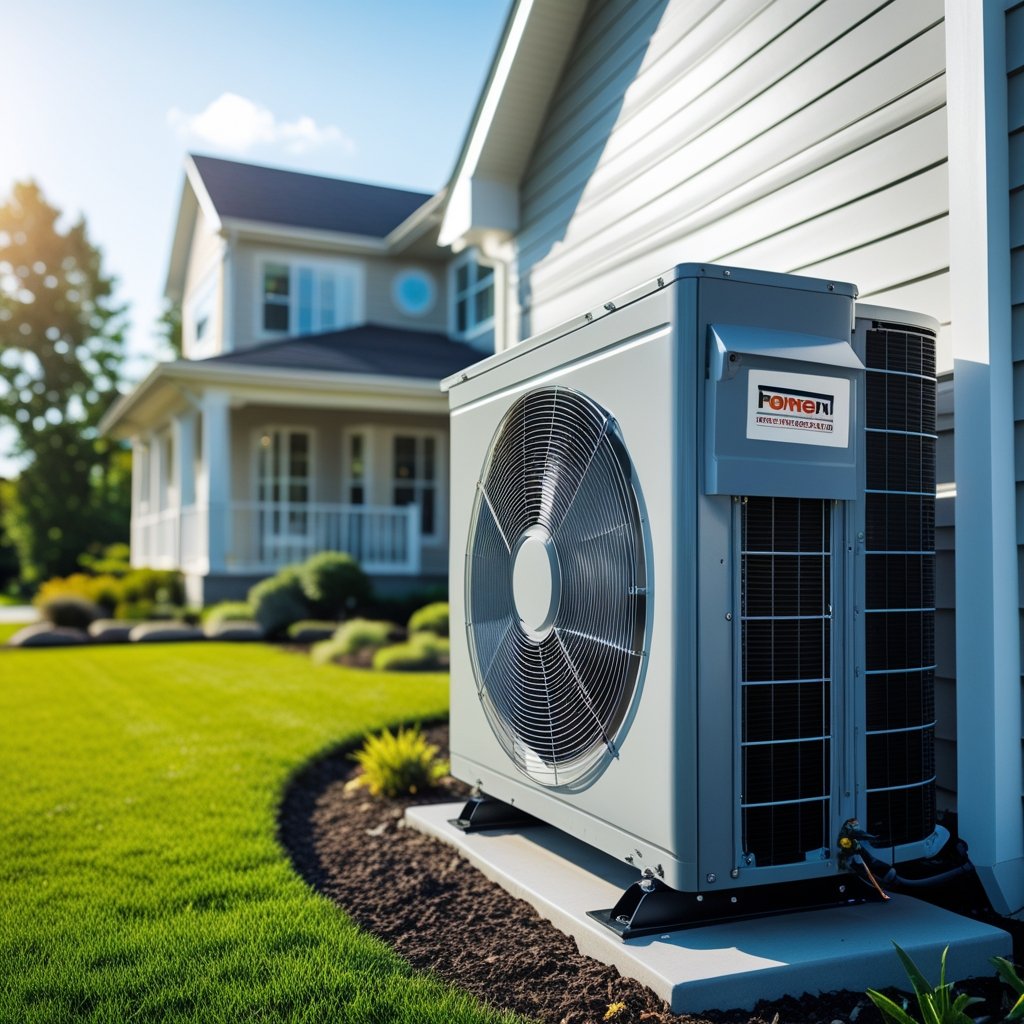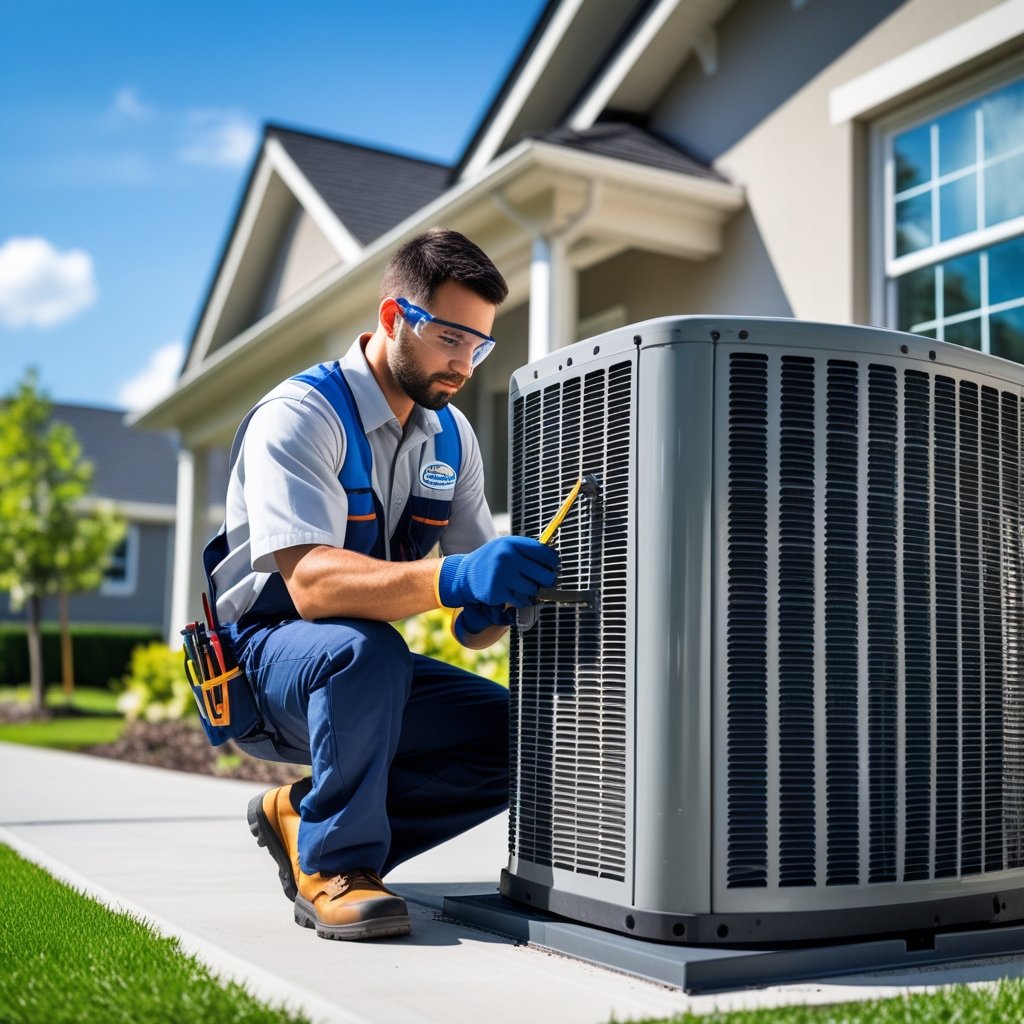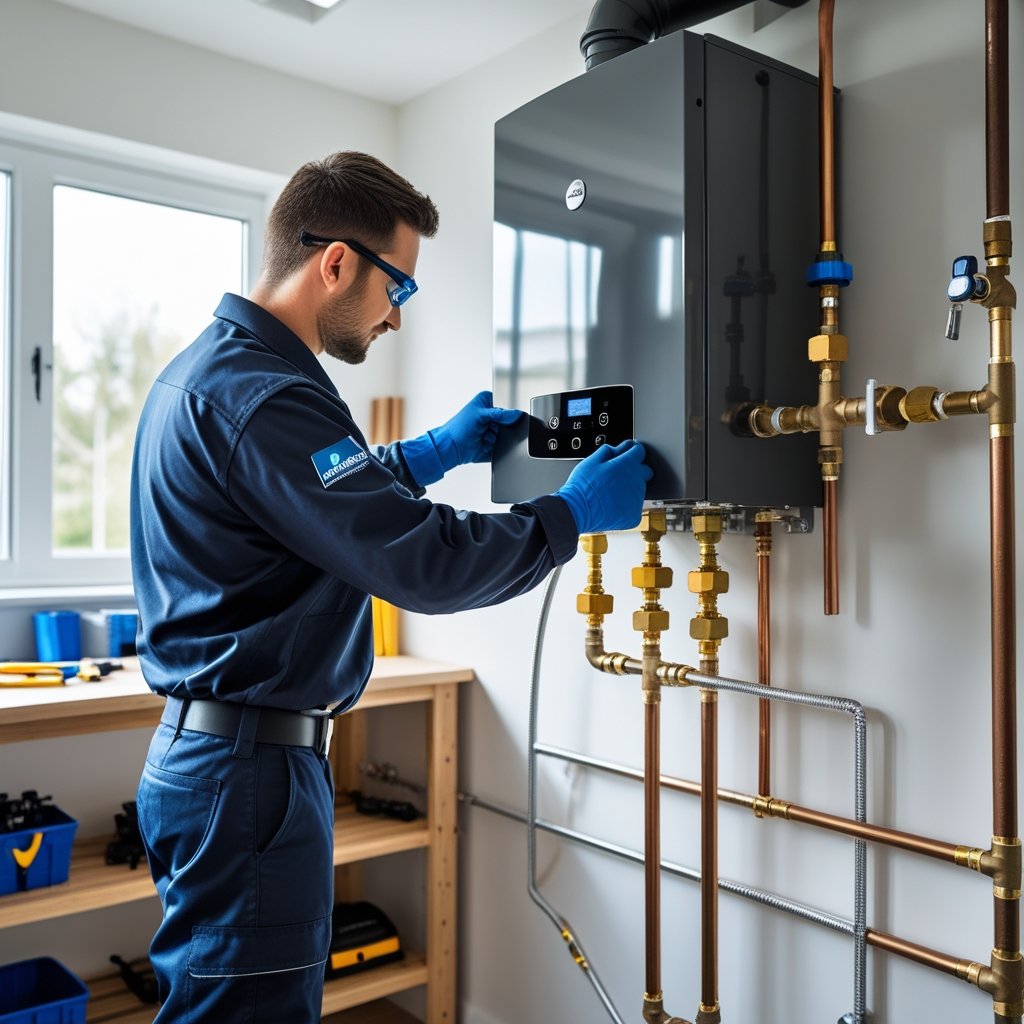A typical hot water heater lasts between 8 to 12 years, depending on type, use, and maintenance. Knowing the average lifespan helps you plan for repairs or replacement before you’re left without hot water.
If your heater’s getting up there in age, or you’re seeing inconsistent temperature or leaks, it’s probably time to call for service. At Leo Kob Co., we’ve helped plenty of folks in Lancaster County and Elizabethtown keep their water heaters going strong with honest advice and solid care.
A few simple habits, like regular checkups, can stretch your heater’s life and keep surprises to a minimum. When you know what’s coming, it’s easier to protect your home and wallet.
Typical Lifespan of a Hot Water Heater
Understanding your hot water heater lifespan helps you plan ahead. Different types last for different stretches of time, and things like water quality and basic upkeep make a real difference. Some warning signs let you know when your heater’s about to give out.
Average Years by Heater Type
Electric water heaters usually stick around for 10 to 15 years. Gas models burn out a bit sooner—8 to 12 years is typical, mostly because combustion wears things down.
Tankless water heaters, which only heat water when you need it, can last up to 20 years. Since they don’t store water, they avoid some of the corrosion headaches.
Atmospheric vent water heaters, common around Elizabethtown and Lancaster County, tend to last about 10 years. Knowing what you’ve got helps you set realistic expectations.
Factors That Affect Longevity
A few things can cut your heater’s life short. Hard water with lots of minerals leads to scale, which beats up the tank and heating elements.
Skipping maintenance doesn’t help, either. Flushing out sediment and checking the anode rod slows down corrosion.
Installation matters, too. At Leo Kob Co., we always stress a proper setup in York and Mount Joy to head off early problems.
Power surges or gas issues can also cause early failure, so steady utilities are important.
Signs Your Heater Is Nearing the End
Watch for rust-colored water or weird noises—popping, banging, that kind of thing. Those usually mean sediment or corrosion inside.
If your heater can’t keep up or runs out of hot water fast, some parts might be failing.
Leaks at the base or cracks are big red flags. If you spot these in your Hershey or Lancaster home, it’s smart to call a local pro like Leo Kob Co. to check things out before the heater calls it quits.
Types of Hot Water Heaters and Their Durability
There are a few main types of hot water heaters, each with its own quirks and maintenance needs. Knowing what you have—or want—makes it easier to plan for repairs or upgrades. Family size and energy efficiency also play a role in which model fits your home.
Tank Water Heaters
Tank heaters are the classic choice. They store hot water in a big tank, usually 30 to 80 gallons. Most last about 8 to 12 years. Rust and sediment inside can cut that short.
Flushing the tank helps keep things running well. Since these models keep water hot 24/7, they use more energy than newer types. Picking an efficient model can help lower your bills.
If you’re in Lancaster County or nearby, Leo Kob Co. can handle tank maintenance to keep things humming.
Tankless Water Heaters
Tankless heaters only warm water when you turn on the tap. This setup usually lasts longer—often 20 years or more—since there’s no stored water to cause corrosion.
They’re compact and can help lower your energy costs. The downside? They might struggle if you’ve got a bunch of showers running at once.
For growing families in Elizabethtown or York, tankless systems balance efficiency and long life, as long as you keep up with care.
Hybrid and Heat Pump Models
Hybrid heaters mix a heat pump with a regular electric heater. They pull heat from the air, using less energy. Expect about 10 to 15 years from these.
Heat pump models need space and warm air to work well. If you keep up with maintenance, they’ll save you on electricity.
Regularly checking filters and airflow keeps these units in good shape. Around Mount Joy and Hershey, Leo Kob Co. can help with setup and tune-ups.
Major Influences on Hot Water Heater Lifespan
A few main factors decide how long your water heater lasts. Water quality, installation, and your usage habits all have a say.
Water Quality Considerations
Hard water and high mineral content are rough on heaters. Scale builds up inside, cutting efficiency and leading to corrosion. If your water’s full of minerals, your heater works harder and wears out sooner.
A water softener can help curb scale. At Leo Kob Co., we often suggest water treatment options to folks in Lancaster County and nearby. Flushing the tank regularly also clears out sediment.
If your water quality isn’t great, you’ll need more frequent maintenance. Staying on top of it helps your heater reach that 10 to 15-year mark.
Installation Best Practices
A good installation sets your heater up for a long life. If it’s done wrong, you’re asking for trouble. Using the wrong pipes or skipping ventilation can cause damage or even safety hazards.
Your installer should follow local codes and the manufacturer’s rules. That means correct placement, enough clearance, and safe wiring or gas lines. Local pros like Leo Kob Co. know the area’s codes and quirks.
Make sure your heater sits level and is easy to reach for service. An experienced installer will spot potential problems early.
Usage Patterns and Demand
How much hot water you use—and how often—affects how fast your heater wears out. Big families or heavy use put more strain on the system. Running the heater at full blast all the time wears out parts like the heating element or burner.
If your heater is too big or too small for your needs, it won’t run efficiently. That means a shorter life and higher bills. Keep your thermostat around 120°F to reduce wear and avoid scalding.
Low-flow fixtures and spreading out hot water use can help your heater last longer. Leo Kob Co. can help you pick the right size for your Elizabethtown or Hershey home.
Maintaining Your Hot Water Heater for Maximum Life
Taking care of your hot water heater isn’t complicated. Checking a few key parts and doing some basic cleaning can stretch its life and help you avoid big repair bills.
Routine Flushing and Cleaning
Sediment collects inside your heater over time, hurting efficiency and the tank itself.
Once a year, flush the heater. Turn off the power or gas, hook up a hose to the drain valve, and let a few gallons run out until the water’s clear.
If you hear popping or rumbling, that’s probably sediment—time for a flush.
Folks in Elizabethtown and Lancaster County can call Leo Kob Co. for help keeping things clean and efficient.
Anode Rod Inspection
The anode rod inside your heater attracts rust, protecting the tank. It wears out over time and needs replacing.
Check it every 1 to 3 years. If it’s mostly gone or under half an inch thick, swap it out. This small step keeps your tank from rusting out early.
Skip it, and the tank could corrode and start leaking—never fun.
Temperature Settings
Setting your heater to the right temperature saves energy and protects the tank.
120°F is usually just right—hot enough for showers and dishes, but not so hot it wastes energy or damages the heater.
Anything over 140°F can cause scalding and more mineral buildup. Lower temps mean less sediment and a longer-lasting heater.
Checking for Leaks
Leaks are a big deal. Even a small drip can mean water damage or a bigger problem.
Take a look around the heater for pooled water or rusty spots. Check all the connections, valves, and pipes.
If you spot a leak, don’t wait—call a pro. Leo Kob Co. in York and Hershey handles leak repairs to keep homes safe and systems working.
Catching leaks early can save you a lot of hassle and cash.
When and Why to Replace Your Water Heater
Deciding when to replace your water heater can save you money and headaches. A few things—repair costs, energy bills, and safety—should guide you.
Cost-Effectiveness of Repairs vs Replacement
If you’re calling for repairs all the time, it might be cheaper in the long run to just get a new heater. Fixing a 12-year-old unit can cost a lot, and a new one will probably be more reliable.
Keep track of what you’re spending on repairs. If it’s adding up to more than half the cost of a new heater, it’s probably time to replace. A new unit also means less risk of leaks and water damage.
Leo Kob Co. techs in Lancaster County can help you weigh the options so you’re not overpaying.
Upgrading for Energy Efficiency
Old heaters burn more energy and drive up your utility bills. Newer models have better insulation and smarter heating tech, which can cut energy use by 20% to 50%.
Swapping out a 10-year-old unit in Elizabethtown or York might even get you local rebates. Look for Energy Star ratings for top efficiency.
Upgrading costs more up front, but you’ll save on bills and put less strain on your home’s systems.
Safety Concerns
As heaters age, tanks, valves, and connections can rust or weaken. That means leaks, burst tanks, or gas leaks if you’ve got a gas model.
If yours is over 10 years old and you’re seeing rusty water, weird noises, or less hot water, it could be unsafe. Rust and sediment can even mess up your plumbing.
Leo Kob Co. puts safety first for repairs and replacements in Mount Joy and Hershey. Keeping your heater in good shape protects your family and home.
Extending the Life of Your Hot Water Heater
A little effort goes a long way when it comes to your water heater. Regular maintenance saves you money and keeps things running longer.
Don’t forget the anode rod—it’s there to attract rust and keep your tank safe. Leo Kob Co. can swap it out for customers in Elizabethtown, Lancaster, and beyond.
Check for leaks around valves, connections, and the tank. Catching them early keeps things running smoothly and avoids water damage.
Flushing the tank once a year kicks out sediment that hurts efficiency. It’s a quick job that can make a real difference.
Think about a maintenance plan if you’re in York, Hershey, or Mount Joy. Plans usually mean priority service, repair discounts, and regular inspections—plus some peace of mind.
When you’re keeping up with maintenance, here’s what you’ll want to do:
- Check and replace the anode rod
- Look for leaks and fix them
- Flush out sediment
- Test temperature and pressure valves
At Leo Kob Co., we treat your home with respect and offer fair, upfront pricing—no pressure for extra work you don’t need.
Sticking to these basics helps your hot water heater last for years.
Environmental Impact of Old Hot Water Heaters
Old hot water heaters tend to burn through more energy than newer ones. That means higher bills, more waste, and honestly, it’s not great for the planet. When these heaters get inefficient, they pump out extra greenhouse gases on top of it all.
As heaters age, corrosion and leaks show up more often. You might end up with water damage, wasted water, and a few headaches you didn’t bargain for. Regular maintenance can help, but eventually, every unit reaches its limit.
When you’re finally swapping out your heater, don’t just toss it—think about recycling. Metal tanks and a bunch of other parts can be recycled, which keeps stuff out of landfills.
A few things to remember:
- Old units chew up more gas or electricity.
- Leaks can waste water and damage your home.
- New heaters cut down on energy use and emissions.
- Recycling the old one? That’s a win for the environment.
If you’re around Elizabethtown, Lancaster, or York, Leo Kob Co. is in your corner. We offer quality service at a fair price and can walk you through energy-efficient options and what to do with your old heater. We want your investment to last and to look out for South Central Pennsylvania’s environment.
Recycling and Disposal Options
When you’re ready to get rid of your old hot water heater, what you do with it matters. A lot of the parts can be recycled, which is just better for everyone.
Most recycling centers will take metal tanks, wires, and other bits. If you’re in Elizabethtown, Lancaster County, or York, you’ve probably got a few options nearby.
Here’s what usually works:
- Drain the tank fully before you move it
- Handle hazardous stuff carefully
- Sort out the metal parts for recycling
If you’d rather not deal with the hassle, companies like Leo Kob Co. in South Central PA can handle removal and recycling when they install your new unit. They know the local rules and take care of it the right way.
Dumping a heater in a landfill? Not ideal. Recycling saves resources, and sometimes you even get a small rebate. Not huge, but hey, every bit helps.
If you’re not sure about the rules in Mount Joy, Hershey, or anywhere nearby, just ask a trusted expert. Doing it right keeps your home and neighborhood safer, and it’s just better for the energy future.
Frequently Asked Questions
Water heaters are pretty reliable, but you might still wonder when it’s time for a new one. Spotting wear, knowing the average lifespan, and understanding the differences between types can keep you out of hot water—literally.
Should I replace my water heater before it fails?
Honestly, yes. Swapping out your heater before it totally gives out saves a lot of hassle. If yours is over 10 or 15 years old, or you’re seeing leaks, rust, or lousy heating, it’s wise to plan ahead. No one likes surprise cold showers or a flooded basement.
How do I know when my hot water heater needs replacing?
Watch for rust on the tank, weird noises, discolored water, or weak pressure. Needing repairs again and again is another red flag. If you’re in Elizabethtown or Lancaster County, keeping tabs on your heater can spare you bigger problems.
What is the lifespan of an electric water heater?
Most electric heaters last about 10-15 years. Some squeeze out a little more life with good care. Getting regular checkups from a company like Leo Kob Co. can help you stretch those years.
Are gas water heaters more durable than electric ones?
Gas heaters tend to last a bit longer—think 10 to 18 years, depending on how you use and maintain them. They heat water faster but need proper venting. Whether you pick gas or electric depends on your home’s setup and what you’re aiming for with energy use.
Can a water heater last 20 years or more?
It’s not common, but if you really stay on top of maintenance, a heater might make it to 20 years. Water quality and regular servicing—especially in places like York or Mount Joy—make a difference. Most people swap theirs out by year 15, just to play it safe.
How quickly does a water heater recover for another shower?
Tank size and the type of heater—gas or electric—make all the difference here. Gas heaters? They usually bounce back in roughly 30 to 40 minutes. Electric models, though, might keep you waiting closer to an hour or sometimes even a bit longer. It’s worth keeping this in mind if you’re juggling back-to-back showers or just don’t feel like waiting around forever.

